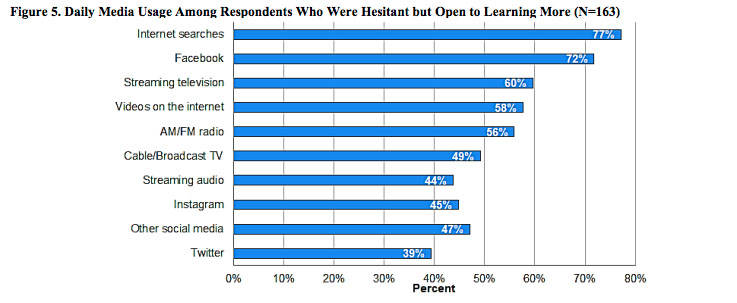A majority of surveyed Alaskans who aren’t planning to get a COVID-19 vaccine said they trusted their friends and family more than federal agencies and health care providers to provide accurate information on the virus, according to a report released on Thursday.
The survey, conducted by the State of Alaska Epidemiology department within the Division of Public Health, included responses from more than 1,200 Alaskans — most of them from the Anchorage municipality and the Matanuska-Susitna Borough — and covered a period between March 14 and March 22. According to the report, the results were “somewhat skewed” toward women, non-Hispanic white people, those on the political left, and people with internet access to take the survey.
The study analyzed the subset group of those surveyed who were not planning to get vaccinated, but who were open to learning more about the shots. The survey sought to analyze this group’s most trusted sources of information and the different types of media they consume most frequently.
Chief Medical Officer Anne Zink said in a press briefing on Thursday that she wasn’t surprised most of those respondents not planning to get the vaccine trust their friends and family more than other sources.
“It’s been a long pandemic — there’s been a lot of news, a lot of media, a lot of cycles — and I think that people have tuned out in different ways,” she said. “Really, their friends and family have become a great place of comfort and support.”
According to the survey, 72% of people not planning on getting the shot responded that friends and family were their most trusted source of vaccine information, ahead of both personal health care providers (61%) and the Centers for Disease Control and Prevention (44%).
The lowest sources of respondent trust among those not planning to get the vaccine included Zink (32%), faith leaders (31%) and employers (29%).
Epidemiology Specialist Sarah Aho, who was also one of the survey’s contributors, said in Thursday’s press briefing that some of the results of the study were unexpected.
“I was surprised that there was less trust in employers and faith leaders,” she said. “And, of course, I’d love it if everyone had great confidence in the state too, [but] it’s OK that they don’t and it’s OK that people are looking to their friends and family for answers.”
Aho said on Thursday that the purpose of the study was to address any questions or concerns that Alaskans have about the vaccine.
“There are so many topics to talk about with COVID vaccines and we really wanted to make sure we are focusing on what we’re hearing from the community,” she said. “So hearing that even eligibility, safety and side effects are really top concerns, we want to make sure we’re tailoring our messages and information to those questions.”
Out of all groups surveyed, approximately 36% of people were vaccine hesitant. Of those who were vaccine hesitant, 45% said they were definitely or probably open to learning about COVID-19 vaccines, according to the survey.
However, of the group of survey respondents who said they were not planning on getting vaccinated, most said it was because they believed they were at low risk for contracting COVID-19, or that the virus itself isn’t serious.
The same percentage of people said they weren’t planning to get vaccinated because of concerns over the safety and concerns over side effects of the shot.
“It’s really easy to overestimate the side effects or the risk of something new,” Zink said during the briefing.
All the respondents themselves were eligible to get vaccinated, the study stated, yet 12% said they were unsure of their eligibility status and another 5% marked that they were ineligible.
“One key takeaway … is that we still need to get the word out that people are eligible to get vaccinated,” Aho said.
Anyone 16 years and older who lives or works in Alaska can get a COVID-19 vaccine free of charge. People traveling to the state will also have the opportunity to get vaccinated at the major airports in Anchorage, Fairbanks, Juneau and Ketchikan starting on June 1.
Another part of the survey analyzed the daily media usage of the respondents who were not planning to get the vaccine.
Over three quarters — 77% — reported internet searches as their primary media use, while 72% said they use Facebook the most. AM/FM radio came in at 56%, while cable and broadcast television reported 49%. Print publications, such as newspapers, were not among the top 10 sources of information most used by survey respondents not planning to get vaccinated.
The survey noted that the above information indicates the media people use for any reason, not just for obtaining information about COVID-19.
“This really underscores the importance of trying to get reliable sources of information out to a wide range of media outlets,” State Epidemiologist Joe McLaughlin said during the press briefing.
Aho said on Thursday that her department is in the stages of finalizing a second public survey about COVID-19 and the emergency use-authorized vaccines.
Reach reporter Camille Botello at camille.botello@peninsulaclarion.com.

